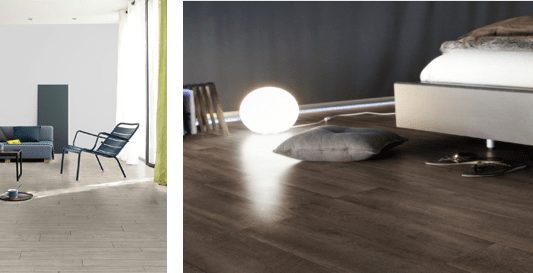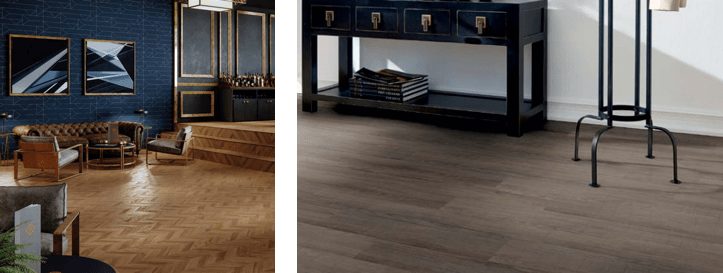April 11, 2019

Over the last 20 years vinyl flooring has become the go-to flooring type in both residential and commercial spaces for its durability, practicality, and its limitless design options. There are many advantages that are shared by the two types of vinyl, but there are some key features that truly set them apart.
Whether you’re deciding between commercial vinyl sheet flooring or commercial vinyl plank flooring for your business, to luxury vinyl tiles for your home, we lay out the facts to help you make the right choice.
 When it comes to visual appeal and authenticity, vinyl flooring is unmatched. One of the main reasons vinyl flooring has become such a popular choice is that it can be printed to mimic a wide variety of materials, including hardwood, ceramic tiles, and natural stone. However, the key difference between sheet vinyl and vinyl planks/tiles lies within the production.
When it comes to visual appeal and authenticity, vinyl flooring is unmatched. One of the main reasons vinyl flooring has become such a popular choice is that it can be printed to mimic a wide variety of materials, including hardwood, ceramic tiles, and natural stone. However, the key difference between sheet vinyl and vinyl planks/tiles lies within the production.
Vinyl sheet, or roll vinyl is typically installed using one to two large sheets that have a photographed image of the pattern inserted below the wear layer. Due to its production process, sheet vinyl is bulky, expensive and is only capable of making one style per sheet. However, sheet vinyl can be printed with grout lines to mimic the look of seams and create a more authentic feel.
But, if we are just focusing on authenticity and visual appeal, vinyl planks/tiles far exceed sheet vinyl. Commonly known as Luxury Vinyl Planks/tiles, are manufactured individually and can be cut into smaller tiles and planks to produce any number of shapes, patterns and designs. You can even take it a step further and have grout installed in between the seams to achieve an authentic three-dimensional look of hardwood or ceramic tile that feels more real underfoot.
When it comes to costs, vinyl sheet is the cheaper option per square metre because it can be mass-produced into huge rolls without having to be individually precisely cut. Provided your installer has measured the space properly and has cut the sheets to fit, sheet vinyl is more affordable than tiles or planks.

However, what you save at the beginning may end up costing you in the future as sheet vinyl is harder to repair and replace. When comparing durability, stability, design and customisation, vinyl tiles and planks are a far better choice.

What makes vinyl flooring such a popular choice in both residential and commercial spaces is that it’s highly durable meaning in can withstand high foot traffic, is highly resistant to moisture, and can be easily repaired (if you’ve chosen plank/tile).
Sheet vinyl is usually installed using one or two solid pieces of vinyl, this means you won’t have any seams running between your floor like you do with planks or tiles. This provides greater defence for your subfloor by preventing moisture from penetrating the surface. For this reason, commercial sheet vinyl is the perfect choice for an office, a healthcare centre, or daycare centre where your flooring is subjected to high foot traffic and moisture.
However, when it comes to repairing and replacing damaged vinyl, tiles and planks are much easier and cheaper.
When it comes to replacing damaged or stained vinyl planks/tiles it’s as easy as ABC. Simply remove the damaged tile or plank and replace it with a new one.
Unlike tiles and planks, if your vinyl sheet has been damaged or stained your options for repairs are very limited and you really only have 2 choices. You either replace the entire floor with a new sheet or you cut out the damaged section and fill the gap with a new piece. Unfortunately, both options can be quite costly, you risk compromising water penetrating through the seams of where you cut, and you may also fail to mimic the original pattern.
When it comes to DIY for your home or office, there is no denying that vinyl tiles and planks are far easier to install than sheet vinyl.
Sheet vinyl can be extremely hard and frustrating to install because your working with one large sheet. You need to ensure all your measurements are as accurate as possible, cutting your sheet into a shape that will fit your entire floor space. Even the smallest of mistakes can add up to major material wastage. When it comes to sheet vinyl we recommend take the pro route and hiring a professional commercial sheet vinyl contractor to save on costs, time and efforts.
As for vinyl tiles and planks, they are relatively easy to install once you have carefully planned your design, pattern and layout. You are able to custom-cut individual pieces to match all kinds of sizes and contours of the room, and can usually be completed in a couple of days by a skilled amateur.
Both sheet vinyl and vinyl tiles or planks are quite similar in a sense that they are both highly durable, resistant to moisture, and come in a wide variety of designs and styles that mimic hardwood and stone. It all boils down to what is most applicable to your circumstances, do you own a business and require one large sheet of vinyl? Or are you building a home and want to achieve that traditional hardwood look for a fraction of the cost. Is it a high foot traffic area? What are the chances of you having to replace damaged tiles or areas?
When it comes to purchasing commercial vinyl flooring, it is always a good idea to ask your rep as many questions as possible to ensure you get exactly what you need. If you’re struggling to make a decision or simply just after some advice, contact our team or head into one of our boutiques and we will be happy to assist.